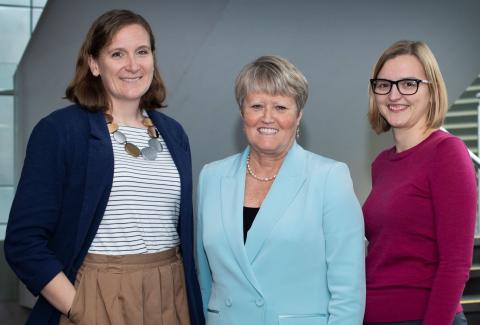
International genomics experts have shone a light on the work of Melbourne Genomics and shared lessons for how the rapidly-advancing technology could be applied more broadly in Australia.
Melbourne Genomics was pleased to host in November two visitors from the UK – Prof Dame Sue Hill DBE, NHS England’s Chief Scientific Officer and Senior Responsible Officer for Genomics, and 100,000 Genomes Project Participant Panel Chair, Jillian Hastings Ward.
Both were keynote speakers at the Translating genomics, transforming care symposium (7-8 Nov) and contributed to a panel discussion facilitated by ABC Radio National host Paul Barclay at a Melbourne Genomics public forum (14 Nov), which will be broadcast on the Big Ideas program in 2020.
Prof Dame Sue Hill told the symposium that genomics is a key focus of the NHS strategic 10-year plan. The NHS Genomic Medicine Service, established in October 2018, aims to sequence 500,000 whole genomes by 2023-24 and provide equitable and consistent care to the nation’s 55 million people.
In addition, the UK Government has previously said it will fund one million genome sequences over the next five years - 500,000 through NHS and 500,000 through Biobank.
A key driver initiative was the 100,000 Genomes Project, a collaboration between the NHS and Genomics England, Prof Dame Sue Hill noted. “The NHS contribution focused on system-wide transformation,” she told the symposium.
Jillian Hastings Ward also presented at the Translating genomics, transforming care symposium and in addition, participated in two media interviews – with Triple R’s Einstein A Go Go program and Radio National’s Drive program alongside Melbourne Genomics’ Data and Tech Manager, Kate Lucas, and Executive Director, Prof Clara Gaff. Jillian highlighted the power of genomics to enact change, through recounting her lived experience with her son, Sam, being diagnosed with a rare genetic disease through the 100,000 Genomes Project. Jillian’s interviews highlighted the central place of patient experience, advocacy and advice in healthcare genomics initiatives – here and overseas.
She later noted: “Trips like these are an opportunity to stand back from the day-to-day bustle and reflect on the wider genomics landscape and the role of patients within it. In this new world of increasingly detailed diagnosis, thanks to genome and exome sequencing technologies and the bioinformatics systems behind them, we are going to find that patients and families are increasingly well-placed to help clinicians make sense of genetic conditions, and to work together with researchers in order to bring forward treatments. This spirit of collaboration will be essential everywhere, if we are to make the progress that we all want to see.”
About 260 people attended the symposium over the two days, and almost 100 attended the public forum.
Melbourne Genomics would like to thank both Prof Dame Sue Hill (pictured, middle with Ellen Graham, right, Deputy Director, Genomics Unit, NHS England) and Jillian Hastings Ward (pictured, left) for their invaluable contributions during their visit to Melbourne.
